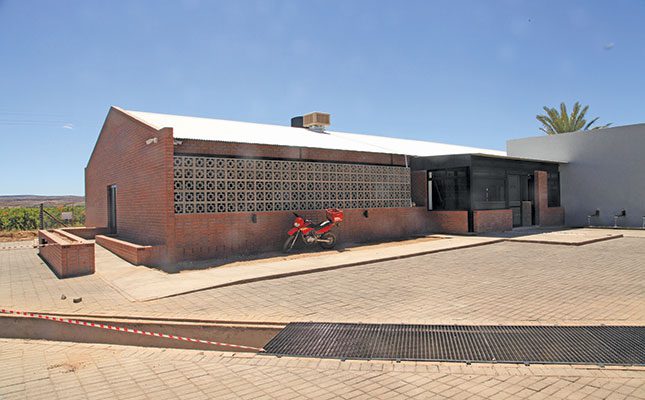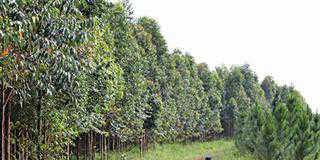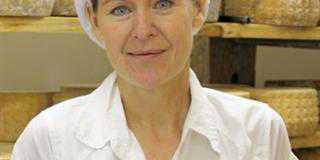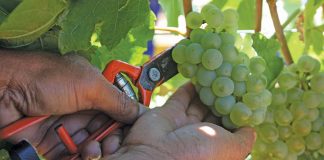
Photo: Glenneis Kriel
When and why were the Vine Academy and Model Farm launched?
Raisins SA’s board got the idea to start the Vine Academy and Model Farm around March 2020, as part of an effort to ensure the future competitiveness of the raisin industry in the Lower Orange River Valley in the Northern Cape. South Africa is the world’s fifth-largest producer of raisins, and more than 80% of our output comes from the Orange River Valley.
Tell us more about raisin production in the Orange River Valley
The Lower Orange River Valley comprises 44 000ha of irrigated land, with grape production representing more than 60% of the total production area. The industry is a major contributor to the region’s economy; it employs about 50 000 people and generates approximately R6 billion each year.
How will the Vine Academy improve the competitiveness of the industry?
Human resource capabilities and skills have been identified as major constraints on the industry. This applies both to farmworkers and young professionals entering the sector.
The main aims of the Vine Academy are therefore to upskill and empower the workforce, and to equip emerging growers with the skills and knowledge they need to graduate to commercial status as quickly as possible.
And the Model Farm?
This aims to generate research and demonstrate agricultural practices and techniques that are relevant to the unique climatic and production conditions of the Lower Orange River region.
Up until now, most of our research and development capabilities have been imported from the Western Cape. Farmers in the Northern Cape have had to fund the testing of new research, technologies and developments out of their own pockets and on their farms, and the Model Farm intends to reduce the associated risks and costs by conducting these tests for the farmers under our climatic conditions.
Research will be conducted on raisin, wine and table grape production. Many farmers here have a mixture of these three, and knowledge gained in the one can often be applied to the others.
What does this mean in practice?
The Vine Academy and Model Farm aim to co-ordinate training and skills development. There is also the potential to extend activities to other production regions over the long term; provide accredited courses at NQF levels 2 to 7; facilitate and manage internships, graduate programmes and agri-extension officers; establish an online information-sharing platform for job-seekers and companies looking for employees; offer bursary support to students; and provide access to land, water and infrastructure to support research and development.
Where are the Vine Academy and Model Farm located?
They’re on 33ha leased from Hoërskool Martin Oosthuizen in Kakamas, Northern Cape. In the past, the property was used to provide practical farming experience to scholars, and was thereafter leased to a local commercial grower for 20 years. Little financial benefit flowed to the school, however.
We’d like to support and strengthen the school’s operations through the Vine Academy and Model Farm, while increasing the competitiveness of the raisin industry.
Please describe the infrastructure of the facilities.
The school had vineyards before we launched the project, with water rights for 31ha.
Unfortunately, most of the vineyards are old and neglected, and we therefore removed 3ha of them last year, replacing them with 1,2ha planted to dried grapes and 1,8ha planted to lucerne. Today, 16ha are planted to dried grape production and 9ha are under wine grapes.
The school’s old pig houses and shed were transformed into the academy. The facility has two boardrooms and a conference hall that can accommodate approximately 130 people. The hall can be subdivided to accommodate smaller groups.
Have you had your first intake of students?
No, the academy is still under construction and we need to appoint staff to run the operations. If everything goes according to plan, the Vine Academy will see its first intake for a two-year plant production diploma, focusing on vineyard management, by 1 July 2023.
And the Model Farm?
The Model Farm employs eight permanent staff and makes use of 42 seasonal workers to help with the pruning and picking of grapes.
Have any functions been hosted at the venue?
We hosted the South African Agricultural Teaching Association in January of this year and Villa Crop Protection hosted an information day for farmers in October 2022, before construction was completed.
Raisins SA also hosted the Agriculture Graduate Symposium in partnership with the Northern Cape Department of Agriculture, Environmental Affairs, Rural Development and Land Reform.
This programme, which has been running for three years, places students with farmers to gain practical farm experience. Seventy- four students were placed for 2021–23, and 80 students will be placed this year for 2023–25.
What trials will be conducted at the Model Farm?
The goal of the Model Farm is to equip farmers with knowledge to improve their production efficiencies and long-term sustainability. Last year, Provar, an independent fruit cultivar and rootstock evaluator, started rootstock evaluations to compare the potential, adaptability and resistance of GRN2, GRN4, 143B, Freedom, Paulsen 11-03, Kingfisher and Minotaur rootstocks. All of these are on the Selma Pete grape variety.
N-Drip, the developer of a gravity-powered micro-irrigation system, is evaluating the use of double dripper lines on dried grape vineyards under flood irrigation. Other research is focusing on the use of lucerne to reduce soil-borne diseases between the removal of old vineyards and the establishment of new ones, and evaluating the efficacy of various herbicides.
We’re also evaluating the use of oat seed, supplied by Agricol, as cover crop in dried grape vineyards, and its effectiveness at suppressing weeds. Research on the different methods of drying grapes is also being conducted.
How much did the development cost?
Our five-year budget, from 2021 to 2025, amounts to R21,86 million. The budget is for buildings and infrastructure worth R8 991 700, biological assets worth R8 246 470 and plant equipment and tools worth R2 634 180. Unforeseen costs at 10% of the subtotal, amount to R1 987 235.
Where did you get funding for the development?
From various sources, most of which are industry partners who benefit directly from the project in terms of quality improvements for the industry. The biggest financier is Kgodiso Development Fund, which committed R12,85 million in blended funding to kick-start the project and give the academy the opportunity to look for additional funding.
What are the biggest challenges?
The main challenge is to get the project fully financed without any debt funding, so as to allow the project to put funds back into the industry transformation agenda.
We’re also sitting with many old vineyards that are no longer commercially viable, as well as younger vineyards requiring expensive nutritional and infrastructural improvements.
The other challenge is to get the academy and farm fully operational. In other words, to ensure that we attract enough students and get facilitators with the necessary skills and experience to produce graduates who can make an immediate, meaningful contribution to the agriculture sector.
The same applies to the Model Farm. We’re inviting other role players with relevant new ideas or technologies to come and test their products at the farm. This means that the Model Farm will pay the ‘school fees’ rather than the farmers.
What are your plans for the next three to five years?
We would like the academy to become independent of Raisins SA in the medium to short term and to make a meaningful impact on the sustainability of agribusinesses and farms throughout the value chain.
For more information, email Madene Conradie at [email protected]










